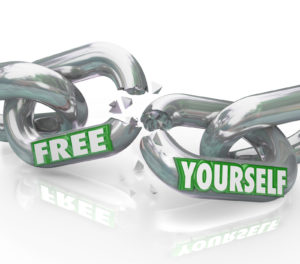This was originally written in 1989. It was written as a tool to help me understand my circumstances as a recent dehiree, as I was about to embark on a position as a career counselor with a major outplacement firm. I have modified it below to fit all dehirees.
———————
Now, having endured an interminable period of six months of unemployment, I feel that it is necessary, as a cathartic, to commit to paper my thoughts, feelings, and reactions to now being a “USED TO BE.”
The most devastating and powerful emotions that run through your mind once you get past the stages of denial and anger, (Kubler-Ross Model) is that YOU no longer exist, not merely just professionally, you don’t have a position (location), a place to go!
The very concept of “position” is not merely annoying; it is overwhelming. The word position connotes a psychological/physical location that acts as an anchor for most adults.
The concept of unemployment, (transition), is dealing with the loss of place, i.e.: identity. You do not have a title, i.e.: no name can call yourself.
You are faced with the task of finding a meaning and a purpose to your existence. You must find a new familiar “location,” that feeling of dislocation cannot be displaced or rectified by a housework campaign; indeed, it may be exacerbated by it.
Your prior psychological and organizational efforts are not material. The following ever-present questions constantly haunt you, relentlessly. Where do I go? Where do I belong? What do I call myself now? Who do I talk to during the day? What do I do during the day? Initially, the question of where I get income/money is tertiary at best. The most important question is not really what I say when people ask me what I do; but what do I say to myself. How do I explain it to myself during those interminable quiet moments when the phone never rings?
The emotions of that embarrassment are not just disheartening, it is nearly debilitating. Especially, if you have been imbued with the Puritan work ethic; and you are now disconnected from the world you knew before you were thrown into transition/unemployment. The umbilical cord to your world has been severed and not tied off, you feel as if you are hemorrhaging. The feeling for most people is much the same as that of being disemboweled while alive.
 I never really understood the incredible negative psychological impact of standing in line for 2 hours at DET to get your “check” could have. Nor did I fathom the overwhelming feeling of impotence that a networking meeting of over 500 “unemployed” professionals would have on me personally. I do now! It is dehumanizing, and one cannot help but tend to succumb to the easy temptation to lose respect for one’s self-worth.
I never really understood the incredible negative psychological impact of standing in line for 2 hours at DET to get your “check” could have. Nor did I fathom the overwhelming feeling of impotence that a networking meeting of over 500 “unemployed” professionals would have on me personally. I do now! It is dehumanizing, and one cannot help but tend to succumb to the easy temptation to lose respect for one’s self-worth.
Though they were very supportive at the DET office, you are still the one that must stand in line, and stare at the other blank defeated faces, and in turn, be stared at as well.
You stare at “others” with no names, as they stare at you with no names. When employed people say they understand and things will get better, they fail to understand that for the dislocated, there is, and can be, no sense of future, initially, it is only an emotionally disruptive past and an ever-painful future. There is no tomorrow, for tomorrow holds no promise of “place.” Tomorrow still only holds that promise of dislocation. The best analogy is that being unemployed feels like needing root canal work immediately and having to wait six days or more for an appointment to see the endodontist. The pain may not be excruciating yet, but it is persistent, constant, and gnawing during the day and more especially annoying at night.
When one has been responsible for people, with the constant cell phone, beeper, fax, and personal contact. When that contact is severed, you feel disoriented. With each passing hour of unemployment, you feel that you cease to exist bit by bit. Your tie to your old reality decreases, and the void grows. Slowly, excruciatingly so, you become a wraith of your past self, i.e.: you become a USED TO BE. You have no name, no rank, no serial number, only an arbitrary place in a very long and impersonal line, holding tightly to your DET ID card and driver’s license to get your “dole.”
The American playwright Eugene O’Neill wrote a play “Morning Becomes Electra.” All the characters wore a belt of different faces (personas) and marks, each used when speaking to another character. During unemployment, you feel as though they have taken away all your masks, your identity, YOUR PERSONA, your ability to communicate with past workers, family, children, friends, spouse, and most importantly yourself. As Robert Burns said, “O’ to av the gift, to see ourselves as others see us.”
After much pain and dislocation, you will eventually conclude that your new task during unemployment is to reorient yourself. To find out who you really are. What do you want now, why, and what experiences have you had that will get you there? Stop attempting to regain what you have “not” lost. “They” cannot take away who and what you are, not what you were, your title was just transient, and no one is non-expendable.

You must begin now to focus on and seek your five major strengths, as a worker, and more importantly as a person. Your goal is to re-establish, not who you are based on a “job description,” or title, but who you are based on why someone would employ you to do what you do best. The reasons for your unemployment are immaterial. What is vital is to discover the potential reasons for your forthcoming re-employment. What can you give a new employer, and why should someone change your engagement?
You must realize that when you are shopping for a new position someone (either you or the new employer) is at “risk.” That future employer may risk their immediate job, their possible career, and most importantly their professional reputation when they contemplate hiring you. If they “buy” you, they must feel confident that you will bring them no grief, now and in the future. There is no question that you can do the job, but can you be safe for them, accomplish your tasks, and make yourself proud?
We must all be attuned to the fact that a sale is made on every interview, either you get an offer, another interview, or the employer sells you a “valid” objection and a rejection notice.
You must constantly keep in mind the sales formula; V=N+A-C, i.e.: value equals need plus application minus cost. There are indeed two kinds of costs. One cost is fiscal, the other is emotional (risk), and the fiscal cost is most often irrelevant in all sales processes. If someone wants the product, “you” the price must “feel” good. We can always rationalize the fiscal cost.
The most important concept to remember in every interview situation is to locate the needs of the client (employer). Why does s/he wish to employ someone? What does s/he expect? What extras are hidden that s/he might expect? What kind of growth is expected from you? Your personal needs become secondary; they are not unimportant but have no real bearing on why the employer should hire you.
I can’t tell you what to ask for in your next interview, but what is most important is what does the employer expect from you as his/her new employee? You cannot emotionally afford to lose yourself in your new “position.”
The job search must be a positive attempt at matching your skills to the needs of others, not the panic of fitting a square peg in a round hole. You must get past the emotional “quicksand” of the position concept and move to the reality of today’s tomorrow. You must fit who you are, to the prospective employer and not the obverse.

You can succeed if you wish to, but you must want to succeed. You are not a failure for not currently being employed; you are a failure to wallow in the depths of self-pity. My adage is that motivation is a 20 ft pole, the real question is position. If it’s behind you keep running from it, and yes, it is gaining on you, but if it is in front of you, it can be used to vault to that next new level and that new job and new opportunity and concomitant rewards.
This paper was written to let everyone who has gone through this dislocation or job loss know that you are not alone; more importantly, there is a new “life” out there for you.
Success is shopping for that new “location.”
Bruce S. Dreyfus




